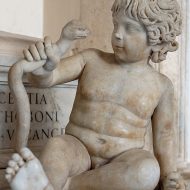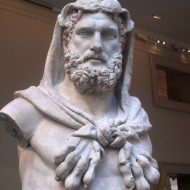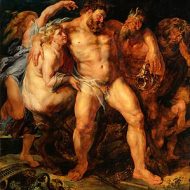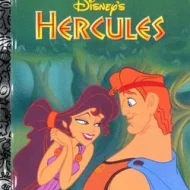Hercules : The Roman Hero
Listen
At a glance
| Description | |
|---|---|
| Origin | Roman Mythology |
| Classification | Demigods |
| Family Members | Jupiter (Father), Alcmene (Mother) |
| Region | Italy |
| Associated With | Strength |
Hercules (Roman)
Introduction
The demi-god Hercules was regarded as a great hero for the people of Rome and Greece. He was known for performing various deeds that no mortal could. Hercules was an everyman who had bad days and even died due to another’s trickery. These stories were entertaining, but they also told an important lesson to an audience: If bad things can happen to a hero, they have nothing to be ashamed of.
The most famous of his activities was the 12 labours that Hercules was asked to perform by his cousin Eurystheus, who was the king of Mycenae and Tiryns. The first set of labours numbered only ten, but they eventually grew to twelve.
- To kill the Nemean Lion who was impervious to all weapons.
- To kill the monster known as the Hydra who had nine venomous heads and, when one was cut off, two more would grow in its place.
- To capture the Cerynitian Hind who was sacred to the goddess Artemis.
- To capture the Erymanthian Boar.
- Cleaning the Stables of Augeius in a day.
- To drive away the Stymphalian Birds.
- To bring back the Cretan Bull from Knossos.
- To bring back the Mares of Diomedes.
- To bring back Hippolyte’s Girdle.
- To bring back the cattle of Geryon, king of Cadiz.
- To bring back the Golden Apples of Hesperides.
- To bring back Cerberus, the guard dog of the underworld.
Physical Traits
In art, Hercules was depicted with various attributes such as his lion skin from killing the Naemean lion and the gnarled club. In Renaissance and post-Renaissance works, he was also shown with a virile aspect and dressed in all white.
Family
Hercules was the son of Jupiter and Alcmene. Although Hercules was regarded as a great defender and champion of the weak, his personal problems started when he was born. In Roman mythology, two witches were sent to prevent the birth of Hercules, but they were tricked by one of his servants.
In one version of the story, the serpents were sent to kill the child in his cradle, but Hercules was able to choke them both. According to another version, the mother, who was identified as Minerva, took her baby to the woods to protect him from the wrath of the king. However, the child was later found by the goddess who saved him.
When Hercules suckled at her breast, she pushed him away and spilled her milk all over the night sky, which created the Milky Way. After giving the baby back to Minerva, she told her to take care of the child. The goddess then imbued the child with more power and strength after she fed him from her own breast.
King Creon of Thebes gave Hercules his daughter, Megara, in marriage as a sign of his gratitude.
Other Names
He was born with the name Alcaeus and later took the name Hercules, meaning “Glory of Hera“, signifying that he would become famous through his difficulties with the goddess. In Greek mythology he was knows an Herkales.
Powers and Abilities
There were many myths about Hercules, and one of these is his victory over Cacus, who was terrorizing Rome. He was associated with the city through his son, Amedeinus. Mark Antony regarded him as a personal god, and Commodus referred to him as a patron god.
Due to the religious beliefs of the Romans, Hercules was regarded as a deity who was involved in childbirth and children. In Roman culture, women were required to wear a special belt that was tied with a “knot” of Hercules. This was made to be hard to untie.
Plautus wrote a play about Hercules that is considered to be a sex comedy. Seneca wrote a tragedy about Hercules Furens, which was about his battle with madness. During the Roman Empire, Hercules was worshipped in Hispania and Gaul.
Modern Day Influence
The myths about Hercules show the world that everyone has a hard time overcoming difficult tasks and situations. Similar to what happened in ancient Greece, people would gather around a table and listen to the stories of the hero. Even in modern mediums, such as comics, television shows, and graphic novels, Hercules continues to be popular.
Hercules is a hero that people can relate to due to how far from perfect he was in life. He was also less than ideal, but he managed to endure his hardships. Having endured his own struggles, one can feel that if Hercules could endure his own hardships, then other people would also be able to survive.
Related Images
Source
Wikipedia Contributors. “Hercules.” Wikipedia, The Wikimedia Foundation, 20 Dec. 2023, https://en.wikipedia.org/wiki/Hercules.
Encyclopedia Britannica. “Hercules.” Encyclopedia Britannica, 2023, https://www.britannica.com/topic/Hercules-Greek-mythology.
GreekMythology.com. “Hercules.” GreekMythology.com, 2023, https://www.greekmythology.com/Heracles/hercules.html.
Perseus Digital Library. “Heracles (Hercules).” Perseus Digital Library, Tufts University, 2023, http://www.perseus.tufts.edu/hopper/search.
Ancient.eu. “Hercules.” Ancient History Encyclopedia, 23 Nov. 2020, https://www.ancient.eu/Hercules.
Frequently Asked Questions
Is Hercules Greek or Roman?
Hercules is actually both Greek and Roman! In Greek mythology, he is known as Heracles, while the Romans adopted and adapted his myths, calling him Hercules. The name “Heracles” means “glory of Hera,” referring to his stepmother, while “Hercules” is the Roman version of the name. Both cultures celebrated him as a hero known for his incredible strength and for completing the famous Twelve Labors.
How was Hercules killed?
In Roman mythology, Hercules’ death mirrors that of his Greek counterpart, Heracles. He met a tragic end due to a poisoned cloak sent by his wife, Deianira. Believing the cloak would secure Hercules’ fidelity, Deianira had soaked it in the blood of the centaur Nessus, unaware that it was tainted. When Hercules put on the cloak, he was afflicted with excruciating pain. To end his suffering, Hercules built a funeral pyre on Mount Oeta and threw himself into the flames, ultimately dying. His mortal life ended, but he was granted immortality and ascended to the heavens, where he was honored among the gods.
How was Hercules honored in Roman culture?
Hercules was greatly revered in Roman culture and often invoked in prayers and rituals for protection and strength. Many temples and altars were dedicated to him, and his myths were celebrated in literature, art, and monuments. One famous sanctuary dedicated to Hercules is the Temple of Hercules Victor in Rome, known for its circular design and Corinthian columns.
What is the significance of the Pillars of Hercules in Roman mythology?
The Pillars of Hercules are two promontories at the entrance to the Strait of Gibraltar. In Roman mythology, they were created by Hercules as a memorial of his journey to capture the cattle of Geryon, one of his Twelve Labors. The Pillars symbolized the boundary of the known world and were associated with strength and exploration. They also served as a navigational marker for ancient sailors.
What are some of the most famous deeds of Hercules in Roman mythology?
Hercules is renowned for completing the Twelve Labors, which include slaying the Nemean Lion, capturing the Erymanthian Boar, and retrieving the Apples of the Hesperides. These tasks were incredibly challenging and showcased his immense strength, bravery, and ingenuity. The Labors were penance for killing his wife and children in a fit of madness caused by the goddess Juno










